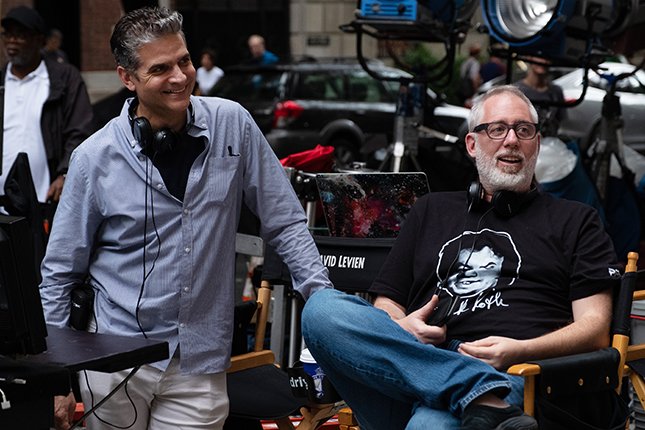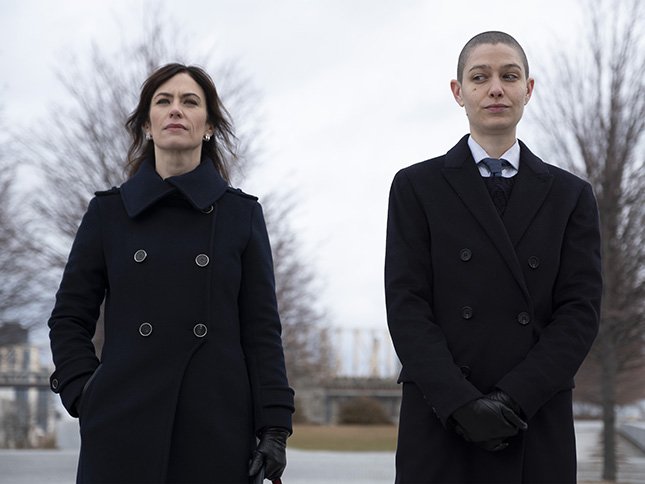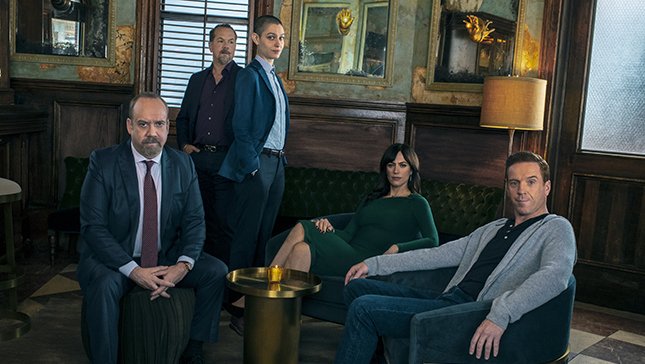Power and alliances are fluid in Showtime’s Billions, just as in real life. (Be warned: spoilers ahead.) There is a constant tension between whether its main players—New York attorney general Chuck Rhoades (Paul Giamatti), Axe Capital CEO Bobby Axelrod (Damian Lewis), Axe Capital performance coach/in-house therapist Wendy Rhoades (Maggie Siff) and Mason Capital founder Taylor Mason (Asia K. Dillon)—are good people driven to do bad things because of their positions or fundamentally bad people who have wound up in positions of power because of their willingness to set ethics and the rule of law aside when it serves them.
One result of this tension, which never truly resolves, is that alliances constantly realign. The season four finale points toward just such a realignment, as Chuck puts Bobby once more in his prosecutorial sights, feeling, perhaps, that he has completely lost not only his wife’s love but also her respect. Bobby, without fulling realizing it, loses Chuck’s goodwill when it is revealed that the hedge fund manager used his millions to pull some strings and prevent Wendy’s medical license from being revoked. This antagonistic relationship between Rhoades and Axelrod was the starting point for the series in season one, when Rhoades sought to take down Axe Capital for insider trading.

Now it seems the transactional assistance rendered by Rhoades and Axelrod to each other during the intervening seasons was more of a truce than a burgeoning friendship. This shift in energy is where Billions shines, and the show thrives on the interplay between finance and law.
While much of the Billions is spent on the triangle between Chuck, Wendy and Bobby, the other key power player is quant investor Taylor Mason. In the finale, after sparring for the entire season with Axelrod, Taylor is forced to surrender. Axelrod presents his former intern with a choice: Be destroyed or come back inside Axe Capital to run his quant unit. Taylor chooses the latter, but it may be a pyrrhic victory for Axelrod. In the course of taking down Taylor, he throws his love interest, and co-investor, Rebecca Cantu (Nina Arianda) under the bus. Although Bobby wins the battle against Taylor, it’s clear that their rivalry will soon transition into a cold war fought within the walls of Axe Capital itself.
Worth caught up with Billions creators and executive producers Brian Koppelman and David Levien at their offices a few days before the season finale to talk about finance, human nature and what it means to be powerful. This is an excerpt of that conversation. For a full feature interview, see Worth’s upcoming Power 100 Issue on newsstands August 27.


Q: I’ll cut to the chase. Are all the characters in Billions either sadomasochists or sociopaths?
Brian Koppelman: The answer is no. That is a hard no. I mean, the pursuit of power…Power is a fascinating word because there are so many different ways in which the pursuit of power manifests, and then there are so many ways that one can use power, right? One can use power for absolute good or for absolute bad. But most of the people we study, and are interested in portraying, use it for something in the middle. Sometimes for their own uses, sometimes to help other people, sometimes to access that which no one else can access.
And therein lies the drama, right?
Koppelman: We’ve talked to these people [in this world] and listened to them. Although all our characters are fictional, a lot of what we’re doing is reporting ahead of time on the ways in which power is deployed. So that could be the power that an emir in an embassy has. It could be the power that a hedge fund manager has to destroy a company or a market. It could be the power that a sports team owner has to do something great for a city or bad for a city. We’re listening and watching and then, without judging it, trying to show it.
David Levien: Chuck Rhoades was one of this subset who would want to run for office or get appointed to an office that gives them great governmental power. We saw in many of these guys a deep-seated belief that they knew what was right, and they planned on doing what was right for the greater good, if only they could get to that power of decision. Along the way they reconciled doing things that were not good at all.
As opposed to Bobby Axelrod, whose power comes from his enormous wealth.
Levien: On the other side there was a guy who accrued this great wealth at a fairly young age, and all the influence that it brings. He started to feel that these laws of men didn’t apply to him because they were made by political functionaries and people with agendas, and he was in this pure marketplace where small concerns were beneath him. And now these two people are on a collision course.
You’ve crafted the show very carefully so that anytime one of the characters—whether that’s Chuck or Bobby or Taylor—thinks they’re winning, there’s another, bigger threat just around the corner. There’s always someone who’s just as powerful, or maybe a bit more powerful than they are.
Levien: Our show is about powerful people, but in general in drama, your characters need obstacles and challenges. If our characters were omnipotent, it would be very boring. The challenge is coming up with stuff to make them retain their power in a realistic way by constantly having them butting up against other forces. We don’t believe that the world is a place you can just smoothly sail through once you reach an income level.
Just think about that thing that happened with Jeff Bezos. The richest man in the history of civilization basically was getting blackmailed and had to do something completely uncomfortable. [In February, the National Enquirer was threatening to publish compromising photos and texts if the Amazon founder didn’t cease funding an investigation of the publication. Bezos called its bluff.] It wasn’t easy for him.
Koppelman: That was maybe the most remarkable demonstration of power I’ve seen in the last five years. Bezos is so powerful that he could say, “Yes, I did this,” and admit something that most people would not only be loath to admit, but if they admitted it, it would destroy their company’s stock. It would destroy their position. But his power is so great and untouchable that he was able to own it.
It’s two different psychological needs. But beyond Chuck Rhoades and Bobby Axelrod, there’s also Wendy Rhoades and Taylor Mason making a whole different set of plays.
Koppelman: We had this notion that we wanted Wendy to be absolutely as smart, if not smarter, than those two guys in the beginning of this. Our secret plan all along was that Wendy was going to win the first season. Then going forward everybody would understand that it was really the three of them. And then when we got Asia K. Dillon to play Taylor, it became really the four of these incredibly formidable people at the center of the show.

Is it possible for one of them to actually win? Or would that just mean leaving the playing field?
Koppelman: It’s like Gary Cooper in The Gunfighter. You have to really take your gun belt off. You have to really lay it on the sheriff’s desk, and you really have to be able to get out of town and move to some hacienda where there’s no guns and no saloons.
And that requires changing who you are to do that.
Levien: That scenario of retiring to the hacienda and going off the map is very threatening to our characters and to the people that are the population that we based them on. They don’t want to lose that relevance because that’s an energy driver for them. They want to be in the conversation, in the mix, and have the access and be relevant and important. It’s like life blood.
Do you want to be a part of our Power 100 summit? Click here to learn more or to request an invite.







